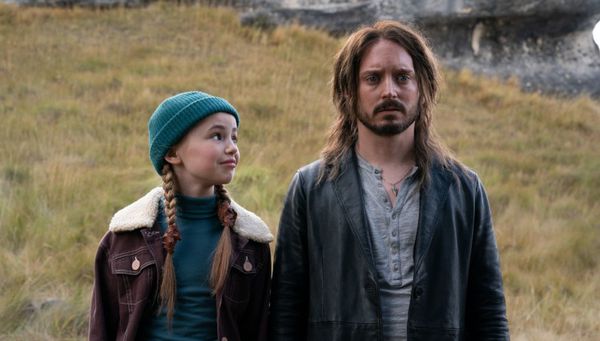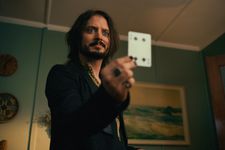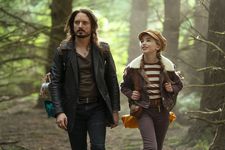 |
| Bookworm Photo: courtesy of Photon Films |
After his 2019 directorial debut feature Come To Daddy, New Zealand filmmaker Ant Timpson pares back the black comedy for the more family-friendly Bookworm. As he reunites with British screenwriter Toby Harvard, no one is chained up in a basement, there's no violent fight in a motel that is hosting a swingers' convention, and this time around, Elijah Wood's character doesn't get stabbed by a prostitute. It all sounds a little dull, but Bookworm brims with creativity and charm. At the heart of the story is 11-year-old bookworm Mildred (Nell Fisher), who takes her estranged father, the failed American illusionist Strawn Wise (Wood), on an adventure to track down the legendary Canterbury Panther.
Before the interview gets underway, Timpson tells me that he and Harvard are cynics, but admits, "I guess we're also soppy sentimentalists at heart." It shows in Bookworm, which gradually embraces sentimentality. In the hands of these two soppy sentimentalists, however, the saccharine and sentimental tones are earned through the humorous escapade, and Mildred's sass.
 |
| Elijah Wood in Bookworm Photo: courtesy of Photon Films |
Instead of interviewing Timpson about Bookworm, I steered the conversation towards the subject of cinema more broadly, which led to him unexpectedly calling out some elitist attitudes.
Paul Risker: From your experiences directing, producing and programming festivals, has your career trajectory surprised you?
Ant Timpson: Oh, God yeah. I imagined it a lot better [laughs]. I was hoping I'd be at a higher echelon by now, but I started too late. I was that kid who was obsessed with movies — from when I was five right up until I was a teenager, I'd go to the cinema by myself.
I bombed out of university and got straight into working on and making films. After I made my first short film, the whole process was to keep on going, but I had a massive deviation into other areas of the business. Whether it was exhibitions or putting on film festivals, it was everything else apart from actually directing films.
I think I was the oldest début feature film director in the world next to the guy who did Blade Runner. I think he and I are competing for the oldest [laughs]. It felt like a long winding road to get to where I should have really gotten to a lot earlier. So, no, there's nothing surprising about it. The only thing that's surprising is that, honestly, I'm not further along from where I really wanted to be.
PR: There's a lot of doubt about what the future looks like for cinema, especially with emerging technologies. It has always been a technologically driven art form, but it does feel that changes are coming fast. As someone with an appreciation for film history, how do you feel about contemporary cinema?
AT: It's completely depressing. Nostalgia has an evil and deceptive way of clouding memories, in terms of that rose-tinted view of how it all was. Now, there's the mass consumption, the clutter of what's out there, the easy one-click nature of how to consume more, and it's now called 'content' — they're not even called movies anymore. The landscape has changed dramatically, and it's harder than ever to make the types of films that I really love.
The last golden age for cinema was the Nineties, in terms of how it still seemed exciting, with the breakouts of directors and types of films. Now, people have these sorts of moments at Sundance, but they seem minuscule and quick. And it's all part of ageing as well — time just starts flying by, the artifice slips away, and nothing seems to have that impact apart from real things. Hanging out with your kids in the garden may have more meaning than whatever the next hot film is.
So, it's a bit of all of that, but in terms of mass consumption and the disposable nature of cinema, it's not what I grew up with — films seemed like the most important thing on earth.
PR: Isabelle Huppert, head juror at the 2024 Venice Film Festival, has expressed concerns about the future of cinema, owing to its current “very weak” condition. In the past year, there have been discussions about how cinema is no longer the dominant art form. Is it as bleak as some suggest? Or is it about penetrating that clutter you mentioned to find those films and directors we should be excited about?
AT: It is, but it's also about how life moves on. For my generation, cinema meant a lot, but for the younger generation, they're immersing themselves in the gaming worlds that offer all those dopamine hits that we used to get from cinema highs. They are more immersive, they're longer, and they have the same sort of cultural high points that we used to have, or maybe not in terms of how affecting cinema used to be with its global reach. Everything had weight and legs, and heft to it. Now, the attention spans are getting shorter and shorter, and so are the moments of cultural impacts for all of these things.
 |
| Elijah Wood and Nell Fisher in Bookworm Photo: courtesy of Photon Films |
Cinema reigned as the dominant art form for a long time, but I feel it has had its time. There will be blips in the future, but I suspect it's nearing its end, and people are going to be sitting there in their own movies, in these VR worlds, which I'm not interested in at all.
It's not going to affect me, but you just have to have kids and see what is meaningful to them. My kids go to the theatre to see movies and they play games. They do all the stuff that normal kids would do, and cinema is not on par with YouTube, it's probably below it to be honest. That's the sad reality. But my kids are getting into long-form TV series now, and they're watching stuff like Lost and Dexter. The long-form narrative is interesting because they haven't given up on it, which is good to see.
PR; How does this climate affect the stories you choose to tell? Are you trying to tell stories that connect with and belong to a certain type of cinema?
AT; It's the stuff I'd want to watch as an audience member if someone else was making them, which is how I approach everything. To be honest, both films were driven by my collaboration with Toby Harvard. Without him, neither of these projects would exist. We've got a couple more as well, but we just make things that we're the audience for, and hopefully there are others.
I know the easiest way to get films up now is to aim for that younger Gen Z or Alpha Generation and have films that are focused on those worlds. Toby and I, out of time in a way, try to make films that don't have all that modern technology and feel like they could have been made within the last 30 years. As much as we didn't want to, we slipped in a cell phone in this latest one, but we'd prefer a world where it's hard to know what time period it was set in.
PR; We shouldn't underestimate the value of that timeless quality, and yet, films are often in dialogue with the time they are made. It raises an interesting contradiction.
AT: Films always amplify a lot those touchstone things that we look at for the period. Thinking of the Eighties, people would go and watch Breakin' or Electric Boogaloo — these extreme amplified versions of what that period was like. If you watched a small-scale drama with people in average clothes, it would be very hard to know the difference between 1982 and 1992.
It's funny how we look back on certain films, and it's always those that are the most exaggerated that we feel symbolise the period. The 2000s are hard because it's a weird amorphous amalgam of quite a few eras. But yeah, timeless is way better. To be honest, it's interesting watching films that belong to a specific moment, like the horror film, Bodies, Bodies, Bodies. That could only be made in the period it was made because of the language and the characters. It captures a moment in time for that generation, but how is it going to age? It's either going to be interesting as a cultural moment or it'll feel naff. It's hard to know how those things will work out.
PR: Another reason why we're drawn to exaggerated types of stories is the need for escape.
AT: There's the other argument that people just want authenticity all the time, whether it's in films or any other area of their lives. For me, it has always been escapism. Life is kind of routine and mundane and film is a way to escape suburbia and go and hang out with Clint Eastwood in the desert for a while.
But I don't know, because there are so many avenues of escape now, the real world sometimes feels more comforting than escapism. Cinema doesn't have the same effect that it used to have, and that's why spirituality and wellness started appealing to people because they were looking for something else.
 |
| Elijah Wood and Nell Fisher in Bookworm Photo: courtesy of Signature Entertainment |
PR: You don't think movies are providing the escape they used to?
AT: I'm not talking for myself — it still clicks for me. Recently, I went on these long overseas flights, like 36-hour trips. The airline, I think it was Emirates, had this huge library which is incredible because usually they're quite limited. All I did was watch pre-1970s movies — old black and white noirs. I fell in love with movies all over again. You can go through moments of being burnt out. If I'd watched a whole series of modern films, I don't think I would have felt sick, like I was eating fast food back-to-back, but I was really nourished by going back to classic cinema.
PR: I remember a filmmaker saying that if you haven't seen a film on the big screen, then you haven't seen it. I tend to push back against this point of view, but I'd be interested to hear your thoughts.
AT: I'm a complete snob and an elitist. I grew up working in cinemas and I collect 35mm prints which I want to see on the [big] screen. So, I'm the worst person to ask about that because I would say the only place to watch a film is in the cinema. But it's absolute bullshit because I know some of my most important memories are from watching an old black and white CRT TV when I was young. It's the movie dummy, is what it is. So, whatever format and how you absorb it can have an impact. But of course, if you have the choice between watching a shitty VHS through an amber monitor or on your computer versus a massive screen, it's a no-brainer.
I feel it's snobbery to say you didn't really see a film because you didn't see it in the cinema. I do it all the time when people mention a film — "Oh yeah, I saw it on first release," or "I saw it at the cinema on opening day." That's just age man, because it's like they weren't even born when the film came out. How the fuck were they supposed to see it in the cinema? All you're doing is being like one of those old pricks, trying to rub it in a younger generation's face."
Bookworm opened the 2024 Fantasia Film Festival and was released on Digital Platforms in the UK by Signature Entertainment.





















